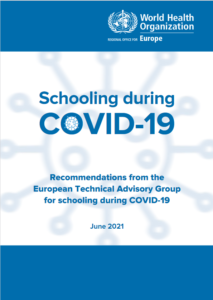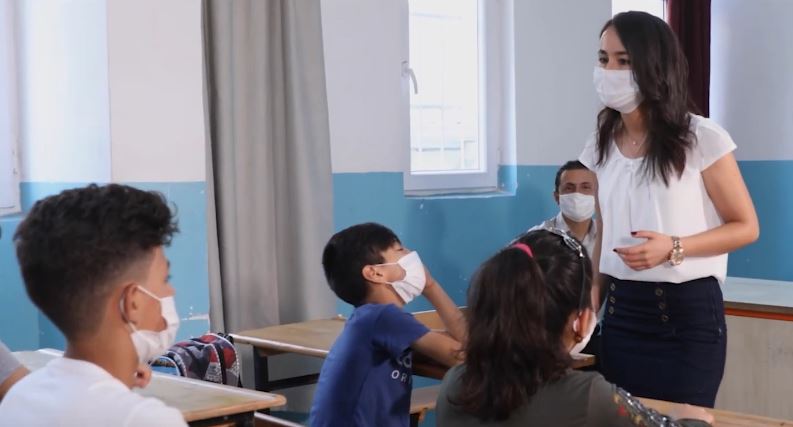Recommendations on schooling during COVID-19 presented to ministries of education and health of countries of Europe and Central Asia
July 2nd, 2021 WHO/Europe, the United Nations Children’s Fund (UNICEF) and the United Nations Educational, Scientific and Cultural Organization (UNESCO) hosted the Third High-level Meeting on Schooling during the COVID-19 Pandemic. During the event, the WHO European Technical Advisory Group (TAG) shared the updated Recommendations with the best available evidence and expert advice on safe schooling during the COVID-19 pandemic.
Schools should remain open for as long as possible with adequate public health and social measures in place, and governments should use the summer months to implement measures that protect in-person schooling in the next school year, say the latest recommendations on schooling during COVID-19.
“The summer months offer a valuable window of opportunity for governments to put in place the right set of measures that will help keep infection rates down and avoid resorting to school closures, which, as we have seen, have such a harmful effect on the education, social and mental well-being of our children and youth,” said Dr Hans Henri P. Kluge, WHO Regional Director for Europe. “The spread of new variants, coupled with the presence of pockets of unvaccinated people in school settings, means that there is no time to lose. The time to act is now. We can’t allow the pandemic to rob children of their education and development.”
“We must get out of the COVID-19-caused crisis in education and health with more resilient education and health care systems, and pursue ambitious goals to recover education and transform it so that every student learns better, has stronger social and emotional skills, better health and well-being,” said Tao Zhan, Director of the UNESCO Institute for Information Technologies in Education (UNESCO-IITE). “We have to act now. The future of this generation is at stake.”
“Despite most countries offering remote learning, the learning loss and impact of not being in school have been challenging for children. This is particularly so for vulnerable and marginalized children. Over the past year, parents, caregivers and children have tried to adapt to their ‘new’ learning environment, but we can’t risk having another year of disruptions,” said Afshan Khan, UNICEF Regional Director for Europe and Central Asia. “We need to work together throughout the summer to ensure that children can go back to school safely and catch up with their learning.”
The updated recommendations focus on eight key points affecting children and schooling during the COVID-19 pandemic:
-
- Keeping schools open as a key objective
- Using tests in school settings
- Assessing the effectiveness of risk-mitigation measures on infection control in schools
- Safeguarding educational outcomes, mental and social well-being of learners
- Considering children living in vulnerable situations
- Changes in the school environment that benefit child health and infection control
- The importance of including children in all decision-making
- Using vaccination for maintaining education
The Recommendations underscore that school closures should be considered only as a measure of last resort, if and when “large outbreaks occur or transmission in the community cannot be controlled by any other measures.”
Effects of the COVID-19 pandemic on schooling
The pandemic has had a dire impact on schooling. UNESCO’s monitoring shows that 44 out of 53 countries in the WHO European Region closed their schools at the national level at the height of the pandemic in April 2020.
School closures have serious effects on the education, development and well-being of children and adolescents. In addition to depriving them of the necessary social interactions that support and promote their mental well-being, school closures led to remote learning arrangements that did not offer the same educational outcomes.
While most countries reopened their schools at the end of summer 2020, rising infection rates in the autumn and winter months led to more stringent measures across dozens of countries, including, in some areas, the closure of schools. However, research carried out in some countries during the winter months of 2020 shows that SARC-CoV-2 incidence among students was lower than in the general population, with secondary infections in schools accounting for less than 1% of infections.*
According to UNESCO, as of May 31, 2021, full and partial school closure affected 26,3 million learner (20% of the total number of primary and secondary students) who did not attend school at all. During 2020/2021 academic year schools were fully closed on average for 4 weeks and partially closed on average for 16 weeks.
 Using these Recommendations will help preventing new disruption in education and ensure that all children and adolescents can return to in-person schooling safely.
Using these Recommendations will help preventing new disruption in education and ensure that all children and adolescents can return to in-person schooling safely.
The full text of the Recommendations is available in English and Russian.
For more information see also the EUobserver article.

